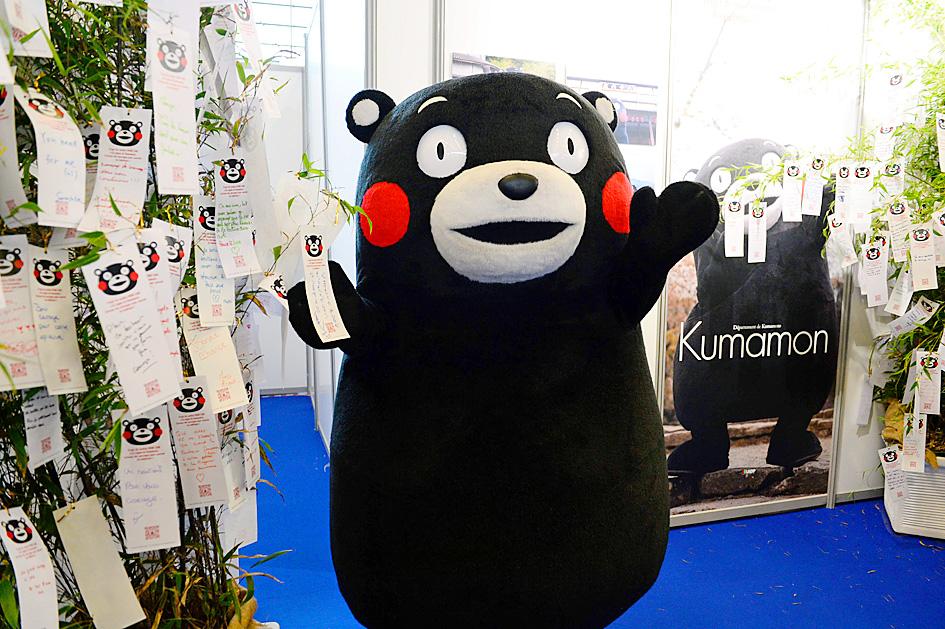A cuddly fairy on a mission to “deliver happiness” to her disaster-hit hometown has been crowned Japan’s most popular mascot, but unseemly rivalry among competitors has forced organizers to announce that this year’s contest would be the last.
Takata-no-Yumechan defeated almost 400 other yuru-kyara (gentle characters) to take the title at the mascot grand prix in the northeastern Iwate Prefecture on Sunday, narrowly beating Yurunakin, a dog mascot from Osaka Prefecture, and Tsurugon, a dragon-like character from Saitama Prefecture.
About 300 other mascots competed in a separate category for companies and other organizations.

Photo: AFP
Yumechan was created in 2012, a year after the city of Rikuzentakata, also in Iwate, was destroyed by a powerful tsunami that killed more than 18,000 people along the northeast coast of Japan.
The white mascot, whose ears resemble the city’s famous pine trees , has a star on her forehead to lead children to safety in the event of a tsunami and dispenses “dreams and happiness” from a bag slung over her shoulder.
She received more than 280,000 votes, combining those cast online and during the two-day event.
Yumechan is likely to hold the title in perpetuity after the grand prix’s organizing committee said that the contest would be discontinued amid concern over the lengths that some supporters were willing to go to give their mascot a fighting chance of taking the title.
Since its debut in 2011, the event has grown in size and prestige, with local governments launching aggressive campaigns to secure online votes.
“Winning had become the goal, and the contest had lost its original purpose of revitalizing the regions,” the committee said, according to Kyodo news agency.
Yuru-kyara are big business in Japan, where more than 1,000 mascots provide a touch of whimsy to everything from the serious business of paying taxes to promoting tourist spots.
Products bearing the image of Kumamon, a black bear from the southwestern Kumamoto Prefecture and the inaugural grand prix winner, last year generated sales of ¥157.9 billion (US$1.5 billion).

In the sweltering streets of Jakarta, buskers carry towering, hollow puppets and pass around a bucket for donations. Now, they fear becoming outlaws. City authorities said they would crack down on use of the sacred ondel-ondel puppets, which can stand as tall as a truck, and they are drafting legislation to remove what they view as a street nuisance. Performances featuring the puppets — originally used by Jakarta’s Betawi people to ward off evil spirits — would be allowed only at set events. The ban could leave many ondel-ondel buskers in Jakarta jobless. “I am confused and anxious. I fear getting raided or even

Kemal Ozdemir looked up at the bare peaks of Mount Cilo in Turkey’s Kurdish majority southeast. “There were glaciers 10 years ago,” he recalled under a cloudless sky. A mountain guide for 15 years, Ozdemir then turned toward the torrent carrying dozens of blocks of ice below a slope covered with grass and rocks — a sign of glacier loss being exacerbated by global warming. “You can see that there are quite a few pieces of glacier in the water right now ... the reason why the waterfalls flow lushly actually shows us how fast the ice is melting,” he said.

RISING RACISM: A Japanese group called on China to assure safety in the country, while the Chinese embassy in Tokyo urged action against a ‘surge in xenophobia’ A Japanese woman living in China was attacked and injured by a man in a subway station in Suzhou, China, Japanese media said, hours after two Chinese men were seriously injured in violence in Tokyo. The attacks on Thursday raised concern about xenophobic sentiment in China and Japan that have been blamed for assaults in both countries. It was the third attack involving Japanese living in China since last year. In the two previous cases in China, Chinese authorities have insisted they were isolated incidents. Japanese broadcaster NHK did not identify the woman injured in Suzhou by name, but, citing the Japanese

RESTRUCTURE: Myanmar’s military has ended emergency rule and announced plans for elections in December, but critics said the move aims to entrench junta control Myanmar’s military government announced on Thursday that it was ending the state of emergency declared after it seized power in 2021 and would restructure administrative bodies to prepare for the new election at the end of the year. However, the polls planned for an unspecified date in December face serious obstacles, including a civil war raging over most of the country and pledges by opponents of the military rule to derail the election because they believe it can be neither free nor fair. Under the restructuring, Myanmar’s junta chief Min Aung Hlaing is giving up two posts, but would stay at the